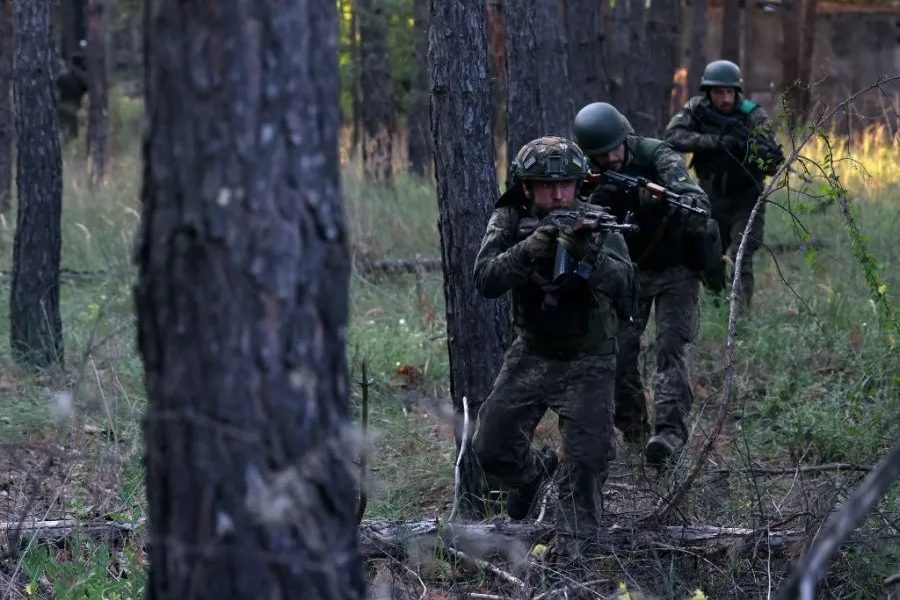Not since the summer of the 2022 invasion have Russian troops been making more progress in Ukraine. Last month alone, they took almost 200 square miles in the Donetsk region. Just fifteen miles now separate the Russian forces from entering the Dnipropetrovsk Oblast. If Russia succeeds, a sixth region will be swallowed by hostilities.
What’s changed? Russia’s ranks are swelling with highly paid contractors and fresh North Korean reinforcements, while Ukraine’s forces are thinning fast. Desertions are adding to crippling manpower shortages. Officially, some 90,000 Ukrainian soldiers have deserted (almost half of them this year), but the unofficial number is much higher. Desertion is becoming a crisis. Unless it’s addressed, no “victory plan” will halt the Russian advances.
The number of deserters has become so unmanageable that in August Ukraine passed a law forgiving soldiers who went AWOL for the first time as long as they agreed to come back. This has had a calamitous effect on discipline, essentially giving men permission to flee. Soldiers who have been fighting Russia for years without relief or rotation, often in positions that seem hopeless, saw it as their chance for immediate leave and a transfer to a more desirable brigade.
The law was intended to rescue the army’s plummeting numbers. Desertion is punishable by up to twelve years in prison, and to lock up thousands of men when they are badly needed on the front line would be a mistake. But the lawmakers ignored the warnings from military commanders that such a law — unprecedented for a country at war — would thin the fighting lines where the battle was most intense. “It is not a step towards illusory democracy. It is a step towards defeat,” said Dmytro Kukharchuk, commander of the 2nd Battalion, 3rd Assault Brigade. “Any violation of the laws of war must have consequences. Any precedent of no punishment encourages the wider public to do the same.”
As soon as the new law was passed, an eight-strong unit fighting in the Donetsk region decided to leave. One of the soldiers — let’s call him Ihor — tells me his story. “When we heard about the law, we called the lawyers,” he says. “They told us to wait a little while the first deserters were forgiven. When we understood how this mechanism works, we left. I was feeling sick, went to the hospital and never came back.”
Ihor says the deserters are not, by and large, men who think the war is futile — they just think that staying in their own position would be suicide. Every war has battles in which the men being sent over the top know their chances of survival are slim. Ukraine is the first country to give them the option of leaving and then volunteering elsewhere. In Ihor’s case, he had come to believe his life — and that of his comrades — was about to be sacrificed for no purpose other than to satisfy the sadism of a bad commander.
“This person, using family connections, came and almost destroyed our combat unit with incompetent decisions,” Ihor says. “We completed his task, but when the Russians returned fire, he wanted to punish us for what he saw as failure by sending us to the trenches to die. For us, this was the last straw.”
Soldiers in Ukraine can’t transfer brigades without their commander’s approval and the bureaucratic procedure can take up to a year. This became one of the main reasons for today’s desertions. Under the new law, soldiers who voluntarily return can select a new brigade — as Ihor did. Now he serves under a new commander in Russia’s Kursk region while waiting for an official transfer. “We are in this war until the end,” he says. But even he disagrees with the new desertions policy, thinking it saved his life but could lose the war. “The front line is collapsing and one of the main reasons is desertion,”!he tells me.
Only reforms inside the army will stop the military from fleeing, he says. He wants to make the transfers easier and introduce a rating system for commanders, where soldiers would anonymously assess their competence so as to root out bad leadership. “The butchers-commanders must be held accountable, not promoted,” Ihor says.
Plummeting morale among the troops is also taking its toll. Thousands of soldiers have been on the front line for almost three years, while others have been fighting since Russia invaded Crimea and the Donbas ten years ago. Kyiv has so far failed to conscript enough people for the understaffed brigades, let alone provide troop rotations or retirement. Most “rotations” are just transfers from one hotspot to another, from Pokrovsk to Chasiv Yar and back.
At first, deserters and draft-dodgers were seen as deeply unpatriotic. Now, feelings are mixed. Some deserters position themselves as patriots who are pushing for reform. One was Serhii Hnezdilov, twenty-four, who left the army last month after five years of service and announced his decision on social media. He demanded reforms to service terms and a fairer mobilization process. “Five million draft-eligible men tell us this is not their war and that we, the military, must be there until victory,” he said. “The authorities remain unable to have a serious dialogue with… citizens who do not fulfil their civic duties.” He is now in custody and is likely to be given the full twelve-year sentence: public desertion poses a far greater threat to the state than thousands that go unnoticed. Some have condemned him, while others argue that when the only paths to demobilization are desertion, injury or death, the choice is clear.
“The soldiers hoped that soon they’d be relieved by replacements ready to step in,” says Artem Chekh, a Ukrainian writer and soldier. “Meanwhile, civilians expected the soldiers to keep wading through that mess, ensuring a comfortable life in the rear for everyone not in service. The dominoes could fall very soon. It could start next March… Because many people have set themselves specific terms of service: three years.” He thinks more will be leaving after three years, with or without permission. “[We are] hostages of war and of the system — a system content to let things slide until they explode. And soon they will.”
The recruitment crisis led the Ukrainian parliament to lower the draft age from twenty-seven to twenty-five in April. Politicians planned to offer a clear route out of the military: permission to leave after thirty-six months’ service. But this clause was removed at the request of army chief Oleksandr Syrskyi. Such promises cannot be made before the war ends, he argued, as Russia has the larger army and Vladimir Putin has nearly four times Ukraine’s population to draw from for conscription. Lowering the draft age seemed to treble the number of soldiers-in-training to 35,000 a month. But numbers have since fallen back to about 20,000. In the summer, all Ukrainian men aged between twenty-five and sixty were obliged to visit enlistment offices and update their military registration documents. Those who didn’t were placed on a wanted list.
There are still many ways to dodge the draft
Men who fear the draft rarely walk on the streets. They leave home only for special occasions and when they do they take taxis. When I was in my home village in the summer, I saw a man using a bicycle to weave between houses when the authorities gave chase. There has been anger from many rural parts of the country that men in towns and villages are being singled out while men in cities roam free. “War for poor,” people call it. In response to the outrage, last month the authorities kicked off a nationwide hunt for draft-evaders. Police raided restaurants, bars, comedy shows and concert venues across the country. One such occasion was a concert in Kyiv by Okean Elzy, Ukraine’s most popular rock band. On October 11, thousands of fans leaving the concert venue were met by enlistment officers, police and secret service agents. They were asked to produce their military registration documents. Those who resisted were arrested. Many started running away and the crowd sided with those targeted, shouting “Shame!” when police dragged them towards the car.
Viktoria Beha was one of the concert attendees who witnessed the detentions. “Shouting ‘shame’ at any detention has become an automatic reflex for Ukrainians,” she tells me. “No one seems to care if the men detained are lawbreakers or if they are innocent.” The men were playing up for the cameras, she says. “One man threw himself on his knees and screamed on video, pretending to be illegally detained. As it turned out, he had not updated his data in the military center.”
There are still many ways to dodge the draft. Exemptions can be booked due to health or critical employment — or, in extreme cases, by buying fake disability certificates (up to $25,000). A cash pile worth $6 million was recently found in the home of a medical authority leader in the Khmelnytskyi region. Other tricks include marrying disabled women or divorcing to pose as the single father of a child. Volodymyr Zelensky, reportedly outraged by the spike in exemptions, has ordered an audit. Kyiv plans to conscript 160,000 in the coming months, but even this will raise the manning of units only to 85 percent.
Zelensky’s advisor said that Ukraine’s allies have been pressuring him to lower the draft age further still to eighteen. The president has refused, explaining this is a war for Ukraine’s future and there are only so many young men it can afford to lose. Ukraine has already lost a quarter of its 40 million population either through deaths or people fleeing abroad. The UN predicts that Ukraine’s population may halve again to just 15 million within seventy-five years. Most men under twenty-five don’t have children yet and the war has meant three deaths for every birth.
Time for changes is running out. Russian forces are just four miles from Pokrovsk, a rail and road hub — the key to seizing the Donetsk region. Once home to 60,000 people, the city braces for battle. The 11,000 who remain have been urged to flee. Outnumbered and outgunned, Ukrainian soldiers are fortifying the streets, but without fresh reinforcements they won’t hold out for long. This will soon become an acute dilemma for Zelensky. He can’t afford to lose more of Ukraine’s land — but who will stop Putin if more soldiers decide to walk away?

























